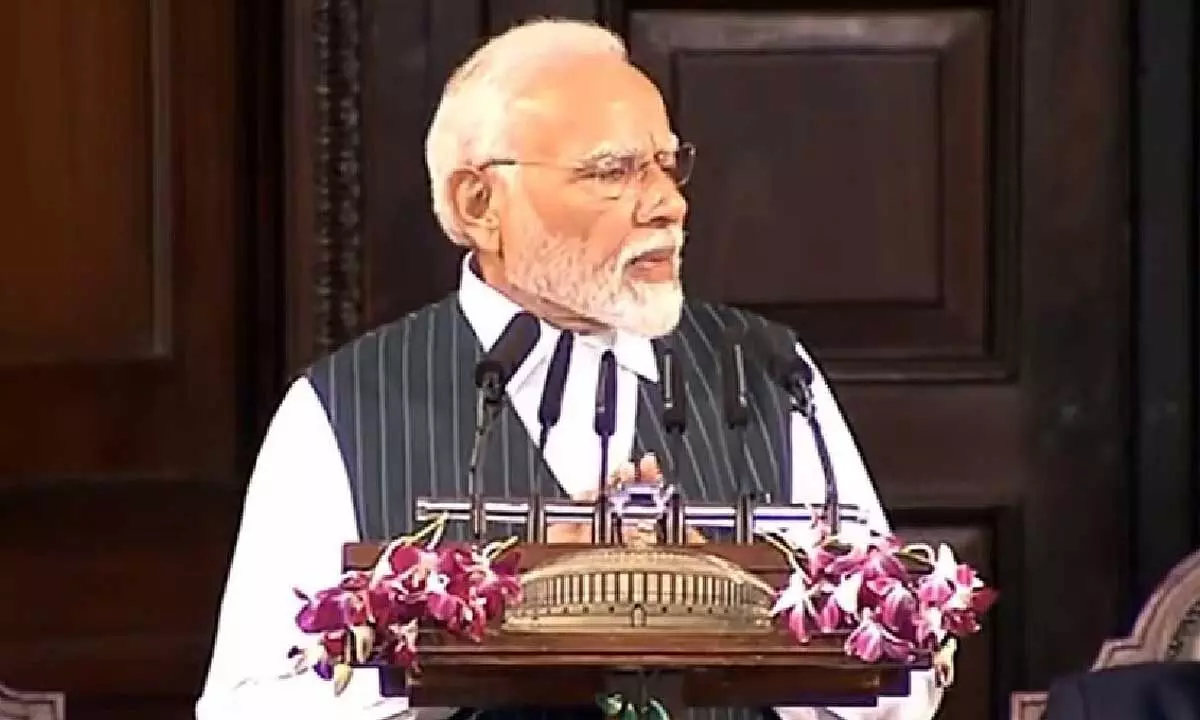Nari Shakti Bill introduced in Lok Sabha by PM

The Government has listed Women's Reservation Bill for introduction in Lok Sabha on the second day of the Special Parliament Session that commenced today in the new parliament building.
The Government has listed Women's Reservation Bill for introduction in Lok Sabha on the second day of the Special Parliament Session that commenced today in the new parliament building.
The government noted that women participate substantively in panchayats, municipal bodies, yet their representation in state assemblies and Parliament is still limited. Role of women is extremely important for achieving goal of making India a developed country by 2047, which PM Modi has stated repeatedly in his speeches.
This bill provides 33% reservation for women in Lok Sabha and Rajya Sabha. PM said it is grand vision grand canvas.
He said first time in 1996 it was introduced. Many times the government led by Atal Behari Vajpayee was made but numbers did not cooperate. That auspicious moment was perhaps meant to be my luck. During Amritkaal it is very important particularly when Nari Shakti is poised to play important role. It is my privilege to welcome this new change and all members across parties have joined hands in presenting this bill, PM said. Nari Shakti Vandan Adhiniyam is the name of the bill, he added.
Highlights of the Bill
The Constitution (One Hundred and Eighth Amendment) Bill, 2008 seeks to reserve one-third of all seats for women in the Lok Sabha and the state legislative assemblies. The allocation of reserved seats shall be determined by such authority as prescribed by Parliament.
One third of the total number of seats reserved for Scheduled Castes and Scheduled Tribes shall be reserved for women of those groups in the Lok Sabha and the legislative assemblies.
Reserved seats may be allotted by rotation to different constituencies in the state or union territory.
Reservation of seats for women shall cease to exist 15 years after the commencement of this Amendment Act.
Key Issues and Analysis
There are divergent views on the reservation policy. Proponents stress the necessity of affirmative action to improve the condition of women. Some recent studies on panchayats have shown the positive effect of reservation on empowerment of women and on allocation of resources.
Opponents argue that it would perpetuate the unequal status of women since they would not be perceived to be competing on merit. They also contend that this policy diverts attention from the larger issues of electoral reform such as criminalisation of politics and inner party democracy.
Reservation of seats in Parliament restricts choice of voters to women candidates. Therefore, some experts have suggested alternate methods such as reservation in political parties and dual member constituencies.
Rotation of reserved constituencies in every election may reduce the incentive for an MP to work for his constituency as he may be ineligible to seek re-election from that constituency.
The report examining the 1996 women’s reservation Bill recommended that reservation be provided for women of Other Backward Classes (OBCs) once the Constitution was amended to allow for reservation for OBCs. It also recommended that reservation be extended to the Rajya Sabha and the Legislative Councils. Neither of these recommendations has been incorporated in the Bill.








